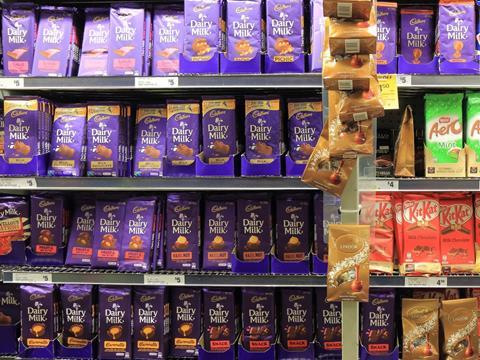
Cadbury Australia has signed a deal with Amcor to source around 1000 tonnes of post-consumer recycled plastic – an amount expected to wrap approximately 500 million of its family-sized Dairy Milk chocolate blocks and reduce its reliance on virgin plastics.
It was reported in 2022 that Cadbury had sourced around 30% (on a mass balance basis) of the plastic required to wrap its 160g to 185g Cadbury Dairy Milk family blocks produced in Australia with recycled materials.
Now, in a move anticipated to halve its virgin plastic requirements for the products in question, the company intends to use around 50% (on a mass balance basis) recycled plastics for its Australian blocks, bars, and pieces.
Set to begin in the first quarter of 2024, the roll out of packaging containing recycled material will start with blocks and extend into bars like Cherry Ripe, Crunchie, and Twirl, alongside pieces wrappers for its Roses and Favourites brands.
Darren O’Brien, president of Mondelēz International Australia, New Zealand and Japan, commented: “Reducing virgin plastic use and supporting a circular packaging economy is a focus for our business and this latest deal to purchase recycled plastic is another important step in our journey. By creating confidence in the market for recycled material, we’re helping to build a future for plastic recycling in this country.
“Chocolate lovers love Cadbury Dairy Milk for its generous ‘glass and a half’ slogan, but when it comes to virgin plastic in our packaging, less is more. By halving our virgin plastic needs in our Cadbury chocolate blocks, bars and pieces portfolio produced in Australia, we are on a path to better packaging.”
Mike Cash, president of Amcor Flexibles Asia Pacific, added: “We partnered with Mondelēz International when they made the first step to move to recycled content for their Cadbury Dairy Milk family blocks packaging, now we’re helping them elevate this ambition by sourcing ~1000 tonnes of recycled plastic to help reduce virgin material across more of the Cadbury chocolate portfolio.
“Being able to source this significant volume of recycled material for Mondelēz International gives them the opportunity to differentiate and grow and demonstrates the collective commitment of Mondelēz International’s leadership.”
The announcement follows Mondelēz International and Amcor’s decision to sign investment agreements and help Licella build what is thought to be one of the first advanced recycling facilities in Australia. Initially, it is expected to process 20,000 tonnes of end-of-life plastics annually, and hopes to scale up to around 120,000 tonnes per year.
The facility is scheduled for completion in 2025.
In similar news, Nestlé has invested £7 million into the opening of Impact Recycling’s new recycling plant; it will convert hard-to-recycle flexible plastics into pellets, which will then be used to produce new flexible packaging like postbags, refuse bags, and bin bags.
Meanwhile, Cadbury seeks to connect with consumers, guide them towards charitable causes, and boost brand loyalty with limited-edition ‘retro’ chocolate bar packaging, a new television advert, and a partnership with Alzheimer’s Research UK.
If you liked this article, you might also enjoy:
The L’Oréal approach to packaging sustainability
The way we talk about plastic needs to change – here’s how to get it right
What steps is Apple taking to make its packaging more sustainable?














No comments yet